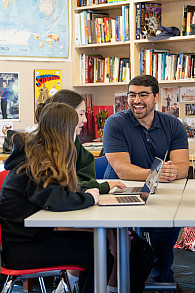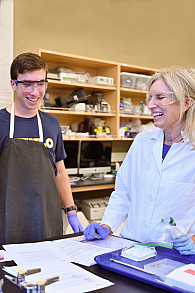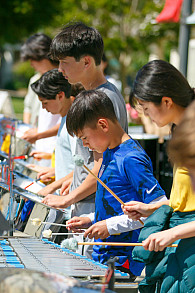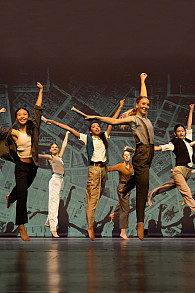- Arts
- Academics
-
Athletics
- Athletics Overview
-
Upper School Teams
- Baseball - Varsity
- Baseball - Junior Varsity
- Basketball - Boys Varsity
- Basketball - Boys Junior Varsity
- Basketball - Boys Freshman
- Basketball - Girls Varsity
- Basketball - Girls Junior Varsity
- Cross Country
- Flag Football - Girls
- Football - Varsity
- Football - Junior Varsity
- Golf - Girls Varsity
- Golf - Boys Varsity
- Golf - Boys Junior Varsity
- Lacrosse - Boys Varsity
- Lacrosse - Boys Junior Varsity
- Lacrosse - Girls Varsity
- Lacrosse - Girls Junior Varsity
- Soccer - Boys’ Varsity
- Soccer - Boys’ Junior Varsity
- Soccer - Girls Varsity
- Soccer - Girls Junior Varsity
- Swimming
- Tennis - Varsity Boys
- Tennis - Boys Junior Varsity
- Tennis - Girls Varsity
- Tennis - Girls Junior Varsity
- Track & Field
- Volleyball - Varsity
- Volleyball - Junior Varsity
- Volleyball - Freshman
- Water Polo - Boys Varsity
- Water Polo - Boys Junior Varsity
- Water Polo - Girls Varsity
- Water Polo - Girls Junior Varsity
-
Middle School Teams
- Baseball - Middle School
- Basketball - Boys Middle School
- Basketball - Girls Middle School
- Cross Country - Middle School
- Flag Football - Middle School
- Lacrosse - Boys Middle School
- Lacrosse - Girls Middle School
- Soccer - Boys Middle School
- Soccer - Girls Middle School
- Swimming - Middle School
- Tennis - Middle School
- Track - Middle School
- Volleyball - Middle School
- Athletics Philosophy & Values
- Athletics Resources
- Camps & Clinics
- Alumni Athletes
- New to Menlo Athletics?
- Student Life
- Support Menlo
- Admissions
- Calendar
- Resources
MENLO SCHOOL • SINCE 1915
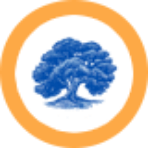 MENLO SCHOOL Since 1915
MENLO SCHOOL Since 1915
-
Athletics
Athletics
Team first
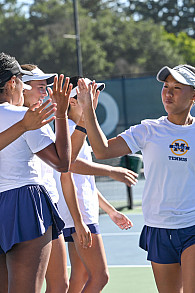
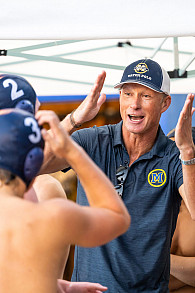
-
Student Life
Student Life
Support, trust, and friendship.
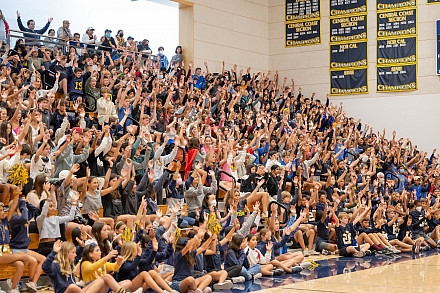
Academics
Student Perspectives: US Science and Applied Science and Engineering
Hear directly from some of our students about their science and engineering courses.
The comments below were taken from student surveys.
(Please keep the ratings score in context; for example, sophomores might consider a class or assignment more rigorous than a senior.)
What should a student know that’s NOT in the course description:
- They should know that this class is very demanding but very rewarding. It is as much about learning the material than learning about yourself.
- This class is totally what you make of it. It’s challenging, but if you work hard, you’re going to get positive results. The chronic condition project in particular stops feeling like a normal class assignment at a certain point. The only way to get as much out of it as possible is to really devote yourself to it.
- This a holistic class - it doesn’t just address all aspects of anatomy and physiology on the biological level and the medical level, it also strives to teach us more about ourselves as students and people.
- Mr. Hardie provides you with opportunities to learn about the body, but it is up to you to hold yourself accountable to taking advantage of them. It involves a lot of self-directed learning, which can allow students to focus more time on exploring what’s interesting to them.
I would recommend this course to students that…
- are interested in the medical field, are curious about the human body, want to learn about themselves.
- like to learn about science in a way that feels tangible rather than theoretical and for students that are prepared to take on a challenge for their own personal growth.
- are interested in the medical field or even if you just want to know how our bodies work it’s extremely interesting. If you are a student that is on top of your work and self-motivated, this course is perfect for you.
I would NOT recommend this course to students that…
- do not want to have to spend a lot of time memorizing/studying anatomy or want a more traditional lecture style class structure.
- need a teacher to teach every bit of the material to them (this is a very independent class, and you truly will get out only as much as you put in).
Highlights from the course and/or specific skills that I learned:
- The Chronic Condition project is eye-opening and a great way to form a personal connection to an illness that you may have never heard of. Out of all the classes I have taken at Menlo, I learned how valuable time management was in this class and was able to hone that throughout the course.
- I learned how to complete research projects and how to learn both individually and within groups.
- I think skill-set wise the biggest thing has been about managing my time and pacing myself the way I need to like I will need to be able to do for college. The chronic condition project was awesome, and I really love how Mr. Hardie looks at not only how the human body works but also how to take care of ourselves.
- Working on my chronic condition project has been a huge highlight for me. Also learning how to draw blood, check a patient’s ears, and check one’s blood pressure has been very interesting. I have learned a lot about time management, how to study/memorize, and how to go out of my comfort zone (ex: reaching out to doctors for the chronic condition project, etc.)
- We don’t have nightly assigned homework, but instead, Mr. Hardie gives us a certain amount of things we have to get done before the test, and it is up to you to space them out during class and homework times. Also, I am a junior taking this class, and I was really nervous about it being too hard. It is challenging, and I spend a lot of time and effort studying for it, but the hard work really does pay off on the tests, and this is by far my favorite class that I am taking! :)
Average “Academic Rigor” Rating (1-5): 4.0
Average “Amount of Homework” Rating (1-5): 3.3
What should a student know that’s NOT in the course description:
- This class is just as rigorous as an AP course and prepares students for the AP test.
- Ms. Buxton makes learning this topic interesting.
- This course is essentially a year-long extension of junior biology; we cover other topics, go more in-depth on previously covered ones, and do more labs.
- Ms. Buxton really cares about your learning and understanding of Biology.
- This is a really fun class, but the long lab reports we write are challenging and you’ll want to ask for help from the teacher and your classmates.
- There is a decent amount of chemistry knowledge needed, especially in some units like cellular respiration.
- Ms. Buxton is the nicest teacher in the entire world and even if you’re not a science person, she will help you. She makes AT Bio super fun!
- If you take Anatomy alongside AT Biology, it’s very nice because the two classes sometimes overlap and complement each other in the topic while not being a duplicate.
- It focuses a lot on independent learning!
I would recommend this course to students that…
- are curious about how different body systems (not covered in first-year Biology) work.
- love bio and want to explore the subject more on their own.
- are interested in pursuing a biology-related field in college.
- enjoyed biology. Are willing to put in the work to study for tests. Genuinely find cool facts about the body and how it works fun.
- really enjoyed junior biology and want a more in-depth experience; are fascinated by the molecular basis for life; are ok doing a lot of textbook reading.
- want to get lots of hands-on experience in the lab.
I would NOT recommend this course to students that…
- are not comfortable with being a bit confused for a few days until the information gels in your head.
- have a hard time grasping difficult topics, as well as students who are not willing to put in the work and time that this course asks of the student.
- have trouble managing time when a firm due date is not set in place.
Highlights from the course and/or specific skills that I learned:
- Understand so many things now that I never thought I could like how food gives us energy, how vaccines work, how the environment can influence our genetic traits (epigenetics), to name a few.
- I am more competent with lab equipment now and can read more scholarly science articles. Everything is super applicable to life so it has made me more interested and empowered to learn biology in the future.
- I learned how to ask for help when I am just as a whole 100% confused.
- We learned a lot of new and useful lab techniques: microscopy, chromatography, spectrophotometry, etc.
- How to write a research paper and reference scientific literature. How to carry out various labs and apply the concepts to problems.
Other comments:
- I would highly suggest taking this class. Ms. Buxton is a super understanding, flexible, and invested teacher. Her enthusiasm for the subject enriches our class experience, and she is great with one-on-one review sessions. The content of the class is also extremely relevant and continues to blow my mind every day!
- I love the class!
Average “Academic Rigor” Rating (1-5): 4.1
Average “Amount of Homework” Rating (1-5): 3.5
What should a student know that’s NOT in the course description:
- It’s more about understanding everything and barely any memorization.
- There is a good amount of lab work in this course, which is always fun.
- This class involves more math than the Chemistry in Sophomore year which makes it more fun.
I would recommend this course to students that…
- loves science and working through problems and combining many concepts that you learn.
- want to delve deeper into Chemistry and molecular composition.
- enjoy chemistry, who are very interested in chemical reactions and love to watch them happen and then figure out why they happen.
- had a solid understanding in Chemistry sophomore year and have good math skills.
I would NOT recommend this course to students that…
- think Chemistry is already hard enough to understand at their current level.
- do not like abstract ideas.
- are not good at details.
- only want to take it for the AP credit.
Highlights from the course and/or specific skills that I learned:
- It is awesome to do much more complex labs and feel like a pro chemist.
- I learned lab skills/techniques, lab writing skills, and I feel like I improved my scientific thinking.
- Being able to recognize certain trends in Chemistry after a while. You get better at the subject after working your mind/exercising it for a semester.
Average “Academic Rigor” Rating (1-5): 4.0
Average “Amount of Homework” Rating (1-5): 3.1
What should a student know that’s NOT in the course description:
- Willingness to work hard is key in this class.
- You should know that a lot of the course builds off concepts in freshman physics so if you want to do it, you should be pretty solid in all of those topics.
- The course is usually structured with lectures and examples done in class, but there is a lot of learning that does happen at home. The homework problems are very important in your understanding of the material.
- It’s fun.
- Although this course can take up a lot of time, there is a very steady and predictable schedule so it never feels too overwhelming
I would recommend this course to students that…
- are interested in math and science. Do not take it if you’re not interested in the subject, it will just make it harder.
- genuinely enjoy physics and want to learn more about it.
- enjoyed freshman physics and did not have to work too hard in that class to get a good grade.
- like a challenge and want to deepen and explore advanced physics concepts. Do it if you love physics.
I would NOT recommend this course to students that…
- don’t want to put in the work or are taking this just for another AP.
- are signing up for this class just to take an extra AP, not interested in course.
- procrastinate.
- do not enjoy solving mathematic problems with equations.
Highlights from the course and/or specific skills that I learned:
- I learned how to break down complex problems by its basic pieces, a skill which is very useful in pretty much everything.
- You learn how to stay organized and use study time effectively.
- I learned how to prepare for tests effectively, and that you often do not understand concepts right away.
Other comments:
- I like the class a lot, but it is challenging.
- It’s definitely a bit of work, but it’s really fun and rewarding.
Average “Academic Rigor” Rating (1-5): 3.9
Average “Amount of Homework” Rating (1-5): 3.5
What should a student know that’s NOT in the course description:
- I think everything is pretty adequately covered.
- There’s a good amount of lab time in the first semester.
- It’s hard.
- There is a ton of study on your own/groups.
I would recommend this course to students that…
- have a genuine interest in science, engineering or math, and not just completing a class for a grade.
- love physics.
- are curious and have strong math skills.
- absolutely love physics and don’t mind leaving a class with more questions than when you came in.
I would NOT recommend this course to students that…
- want a light workload and don’t want to think deeply and critically, and be challenged.
- do not like solving physics problems or do not like labs.
- are shy in the face of algebra or integrals.
- don’t love physics or math or are not competent in either. Or are allergic to getting bad grades.
Highlights from the course and/or specific skills that I learned:
- I learned how to think about really complex systems and I learned this is always something way crazier the further you look.
Other comments:
- It’s awesome!
- It’s a lot of fun. If you liked AP Physics 1-2 I highly recommend it as a next step.
Average “Academic Rigor” Rating (1-5): 4.3
Average “Amount of Homework” Rating (1-5): 4.2
What should a student know that’s NOT in the course description:
- Students will also learn how to pitch ideas well and communicate their business plan. Students will become fluent in business terminology.
- This class will provide you with the unique opportunity to speak with CEOs and successful entrepreneurs as well as become an entrepreneur yourself.
- You will need to tap into your creative side to come up with ideas for companies and products.
I would recommend this course to students that…
- are very good at working independently and assigning yourself tasks
- are creative and good at social networking.
- are very interested in business. Want to have a real-life try at entrepreneurship and running a business? Are outgoing, have a lot of ideas, and are willing to talk to a lot of people.
I would NOT recommend this course to students that…
- are not interested in learning how to build businesses.
- are not willing to work hard and put in the effort to be cohesive and somewhat malleable, this class will be hard for you and anyone you’re working with.
- are intimidated by taking risks, see this as a “classroom class” (if that makes sense). This is not a traditional class in any way. I would also not recommend it to students who aren’t willing to fail because this class will require some mistakes and guessing for you to learn.
Highlights from the course and/or specific skills that I learned:
- Competing in the apparel companies.
- Starting t-shirt companies and pitching our own business ideas.
- Talking with the CEO of DoorDash, building our own companies, learning about Robinhood. Everything we do is unique and interesting.
- Speakers like Tony Xu, learned how to keep track of business finances
Other comments:
- The class grades fairly easily, but if you drop the ball, you’re going to get docked hard
- This class has been my favorite class out of my time at Menlo. I feel like I’m constantly learning.
Average “Academic Rigor” Rating (1-5): 3.0
Average “Amount of Homework” Rating (1-5): 2.86
What should a student know that’s NOT in the course description:
- There isn’t a lot of formal instruction. There are a few days to introduce a topic and Dr. Dann is very helpful when you need him but you do most of the learning on your own.
- There is little nightly homework. However, many students spend lots of additional time in the lab working on projects, which helps you do well in the class.
- It’s going to take up a lot of your life but will be a lot of fun.
I would recommend this course to students that…
- really want to dive in deep and learn a lot in a short amount of time.
- love computer science, math, physics, or general engineering. who love to explore and learn new things and learn by doing.
- enjoy working independently and in teams on freeform but challenging projects.
I would NOT recommend this course to students that…
- cannot work on ASR outside of class, hate working without step-by-step guidelines, hate researching, hate writing papers more than they like doing science.
- do not like trial and error, reasoning/problem solving, teamwork, and engineering, and who are not academically independent (i.e. those who would only like extremely structured courses).
- don’t like a challenge.
Highlights from the course and/or specific skills that I learned:
- I have loved the freedom to build and create in this class.
- Running up hills in a government restricted wind farm, holding a cow skull and being angrily mooed at was a highlight.
Average “Academic Rigor” Rating (1-5): 4.7
Average “Amount of Homework” Rating (1-5): 3.8
What should a student know that’s NOT in the course description:
- This course really gives you a glimpse into what life in a lab could be in college and even post-grad. It especially allows you to explore the various kinds of work you could be doing in a lab.
- The second-semester project is a lot of work outside of class, but it is definitely worth it and enjoyable. Although I knew this class was primarily about research, I didn’t expect for us to spend as much time in the lab as we do, but it is extremely interesting and something I’m passionate about.
- It’s a family!
I would recommend this course to students that…
- love biology, but want more time in the lab and want a different experience with biology.
- are just as comfortable working independently as they are with a partner— you will need to be able to do both.
- really enjoy lab work.
I would NOT recommend this course to students that…
- don’t love doing experiments, or to students who are not interested in learning more about the engineering side of biology.
- are not okay with failure— your independent project will have plenty of problems and will not be perfect. You must learn to troubleshoot and learn from your errors.
- don’t like hands-on projects, basically labs are essentially the whole class, and don’t like independent work.
Highlights from the course and/or specific skills that I learned:
- I have honestly loved have the ability to work in the lab every day. I have learned so many things from culturing cancer cells to purifying proteins to modifying genes inside bacteria.
- I don’t have a specific highlight, but I love that this course allows you to research something you are genuinely interested in. It isn’t like history where you are assigned a topic to research— you come up with your own experimental design. There is plenty of room for creativity in that sense.
- Lots of specific lab skills that will be extremely valuable if I choose to pursue research in college!! I also loved many if not all the labs we did in class!
- Everything. How to plan all experiments in an effective way
Other comments:
- I think this course is one of the hidden gems at Menlo. This has definitely been one of my favorite courses at my time in the high school.
- You don’t have to be a stellar science student to do well or enjoy this course. I came into the class without taking honors or AP sciences, and I have loved being in this class.
Average “Academic Rigor” Rating (1-5): 3.9
Average “Amount of Homework” Rating (1-5): 3.1
What should a student know that’s NOT in the course description:
- It’s more design than it is engineering.
- That a student will not get certified in all of the power tool or get a chance to use them.
- This class is highly dependent on group projects and student leadership positions.
- There is a big range in the projects, some are simple and can be completed in class but some do require additional time in the lab.
- The opportunity that this class provides is for an integration of creativity and design.
- That it is more hands on then I thought it was which was a very pleasant surprise!!
I would recommend this course to students that…
- want a science elective but don’t want something as rigorous like ASR.
- who would like to take an engineering course, but feel that math is not their strong suit.
- like to challenge conventional design by creating new, innovative designs.
- like hands-on projects and studying architecture.
- loves architecture and buildings.
- enjoy building and product creation, who also desire the opportunity to be creative in their designs.
I would NOT recommend this course to students that…
- aren’t very excited about group projects and don’t have any time outside of school to devote to your project.
- dislike group projects, have trouble with presentations, and are looking for an easy class.
- are not very detailed and do not have very much patience and resilience when a project fails.
- have a tough time working in groups to reach consensus.
Highlights from the course and/or specific skills that I learned:
- One thing that I really enjoyed about this class is that I was able to freely design my own products and that I could have not only a conceptual but also a hands-on experience in learning about architecture.
- I learned so much about architecture that I didn’t know and now I can’t see a house that I don’t critique (haha). I loved making the lamp.
- to be patient and not freak out when a project fails.
Average “Academic Rigor” Rating (1-5): 2.8
Average “Amount of Homework” Rating (1-5): 1.9
What should a student know that’s NOT in the course description:
- It is a blend of all the school subjects: primarily science, but also math, English, history, and contemporary issues. It is extremely interesting, educates you on what has happened in the past and what is currently happening in today’s world, and how to change the various environmental problems today, such as pollution and deforestation.
- This class is very writing based and it takes analytical thinking at times in order to truly understand how the environment works. You will also learn the lesser-known problems in the environment that cause just as much of an impact in comparison to more known environmental problems such as climate change.
- While it may sound not as “science-y” as the other science electives such as AP Physics and AP Bio, but it is still pretty rigorous.
I would recommend this course to students that…
- Enjoy environmental issues and care about policy surrounding them
- Enjoy learning about the foundations of our planet, doing fun labs and in-class activities that really help along the learning process, and learning about how to improve their everyday actions to be more sustainable and environmentally-friendly
I would NOT recommend this course to students that…
- Think it’s an easy A and that it does not require any extra work outside of class.
- Don’t care about large scale environmental/world issues and students that don’t enjoy sciences
Highlights from the course and/or specific skills that I learned:
- I learned in more depth about plate tectonics and water/sewage treatment, more specifically the water crisis and how it affects different people in different parts of the globe. I learned about water privatization and the pros and cons of privatizing water and that wildfires are actually a natural part of an ecosystem.
- I really liked when brought our own dirt to see what the composition of the dirt was
Other Comments:
- So far I have loved this class and I am looking forward to the second semester. This course has definitely been challenging for me but I think I have learned a lot and we have gone at a doable pace.
- Having taken chemistry and biology prior makes the course a bit less challenging
Average “Academic Rigor” Rating (1-5): 3.8
Average “Amount of Homework” Rating (1-5): 2.8
What should a student know that’s NOT in the course description:
- You get your hands and clothes dirty a lot.
- This is the most fun class at Menlo. The class description was spot on.
- I would suggest the “experimental” is heavily emphasized, since it is one of the most rewarding and difficult parts of the course. Not everything will work out 100%, and you may often fail, but this helps promote appreciation for ancient societies and their expertise.
I would recommend this course to students that…
- are willing to get their hands dirty and learn new boy scout skills.
- like hands-on experiments and want to apply science and history in the real world.
- are excited about ancient societies, enjoy a mixture of sciences, and enjoy hands-on learning.
I would NOT recommend this course to students that…
- are worried about their clothes getting dirty.
- don’t like hand-on experiments.
- do not like dirt or are not a big science person.
Highlights from the course and/or specific skills that I learned:
- Making a fire, cord making, metal casting.
- Casting the tikis was really fun. I also enjoyed learning about the transition from hunter-gatherer to farming.
- I learned a lot about the transition from the Neolithic to the Paleolithic, and specifically enjoyed learning about gender roles through these transitions.
Other Comments:
- I loved the course.
- Such a fun class and I looked forward to it every day. I learned a lot and continue to talk about the class to this day.
Average “Academic Rigor” Rating (1-5): 3
Average “Amount of Homework” Rating (1-5): 1.33
What should a student know that’s NOT in the course description:
- Along with learning about engineering, you learn a lot about general ways to use tools, so it is a perfect course for beginners and the more experienced.
- The work that you do in this class is highly interactive. There will not be much serious class time, making much more interesting in my opinion. Also make sure you have time to come in outside of class in case you have not been able to finish a project in class.
- It is a ton of fun but involves a lot of patience and if you aren’t willing to fail a few times before succeeding you won’t enjoy the class.
- You have to be incredibly patient. It is basically impossible to go through this class without failing sometime or another. You just have to get back on your feet and keep trying to figure it out.
- One thing that you will face is failure. This failure shouldn’t tell you that your project isn’t going to get you an A but rather an indication that you should fix your project. You shouldn’t feel bad about yourself if your project doesn’t work, you should be happy that you have an opportunity to improve your project.
I would recommend this course to students that…
- are curious about real-world applications of physics, science, and math, or students who want a hands-on class that teaches them to think outside the box and expand their education.
- enjoy challenging themselves and are willing to struggle through some obstacles.
- want to learn more about engineering and are not afraid to have to learn from mistakes.
- enjoy working with their hands and teaching themselves at times rather than having the teacher explain everything. If you enjoy problem-solving and being creative, you will like this class.
I would NOT recommend this course to students that…
- are more interested in getting an easy A. Although there was not an overload of new academic material, the class pushed me to expand my horizon in new directions. In the course, I had to not only learn, but become familiar with and learn to love using new power tools in the lab. If a student only wants a course that looks good on a transcript and is not willing to apply him or herself to jumping into stuff that he or she is probably not familiar with, then this student will really struggle in the class.
- I would not recommend this course to students who are not willing to be challenged and put in the extra work.
- don’t like using their hands, didn’t like physics, or procrastinate. The course involves a lot of hands-on work, calculations, and quite a lot of time outside of class working on projects, so procrastinating isn’t really an option.
Highlights from the course and/or specific skills that I learned:
- The highlight of the course is the exposure to the tools and techniques in engineering. There is no replacement for actually being in Whitaker and working with the power tools, and making something with your own hands that any more theoretical class cannot match. I loved how the course forced me to expand my horizons as a student and learn in new ways.
- I learned to build a wide array of circuits and learned my way around the tool shop. I gained the ability to build something basic in the tool shop if I ever needed something, and I can make sure it’s not kluge.
- I have learned well to fail many times before making something work, and that failure should be expected as a common obstacle in engineering.
- I first realized that I loved the class when we were given an electric toothbrush and just told to take it apart, learn how it works, and put it back together with no guidance. I thought that was super cool. I also love that when I see things in my house, I know exactly what’s going on. I learned how to apply what we learned in physics last year, which was super cool.
- This course taught me the ins and outs of circuits and how different components of circuit work.
- After struggling and struggling, the breakthrough always feels amazing.
Average “Academic Rigor” Rating (1-5): 3.2
Average “Amount of Homework” Rating (1-5): 2.5
What should a student know that’s NOT in the course description:
- This class is Engineering-oriented. It consists of mostly lab work.
- It’s harder for underclassmen, because they don’t have as much science background, but it is still doable.
- We will be dissecting insects.
- This course includes a thorough exploration of neuroscience through the comparison of electrical engineering circuits and the biology of the brain. Participants must be willing to touch many, many bugs.
I would recommend this course to students that…
- are interested in lab work and engineering as well as life science.
- are very interested in science and learning more about fields that are still developing and like getting their hands dirty during experiments.
- have never taken a hands-on science class at Menlo before.
I would NOT recommend this course to students that…
- are not willing to kill/experiment on various insects.
Highlights from the course and/or specific skills that I learned:
- Great class to learn a variety of lab skills.
- Learning how to write papers was very helpful.
- I really liked the cricket lab.
- I loved the final project because it gave me the opportunity to explore a subject that really interested me.
Other comments:
- I loved this class and am now very interested in Neuroscience!
- Not a lot of regular homework, but a lot of work when it comes to labs.
- I absolutely loved neuroscience, and can say with confidence that it was the best science class I ever took at Menlo. It was such a cool opportunity to use all of the resources in the lab and really formulate my own experiment at the end of the semester.
Average “Academic Rigor” Rating (1-5): 3.25
Average “Amount of Homework” Rating (1-5): 2.4
What should a student know that’s NOT in the course description:
- A key aspect of this class is creative ideas which solve real-world problems. The class will help you not only think of creative solutions for real-world problems our world is facing but also perseverance and the ability to think outside of the box.
- It’s mostly project based
- There is more reading than you would expect
I would recommend this course to students that…
- Are willing to get their hands dirty for practical learning but also focus on larger world concepts.
- Want to understand the history and future of water usage and how to create complex and innovative solutions to this real-world problem.
I would NOT recommend this course to students that…
- Someone who does not like to do extra research outside of class and those who like very structured classes.
- Have difficulty working in groups and thinking outside of the box to solve a problem.
Highlights from the course and/or specific skills that I learned:
- I have learned a lot of skills on how to build various wood structures. I also learned how to use CAD and other equipment.
- The hydro-energy unit was fun
- One unit that I enjoyed was the California Water unit. This unit covered how water got to LA and the current systems that are used to transport water across California. All of the topics that we discussed in class are very pertinent since we are all living in California and we can make a change.
- I liked the labs that were more hands-on, which also helped me learn my way around the lab more.
Average “Academic Rigor” Rating (1-5): 2.86
Average “Amount of Homework” Rating (1-5): 2.7
